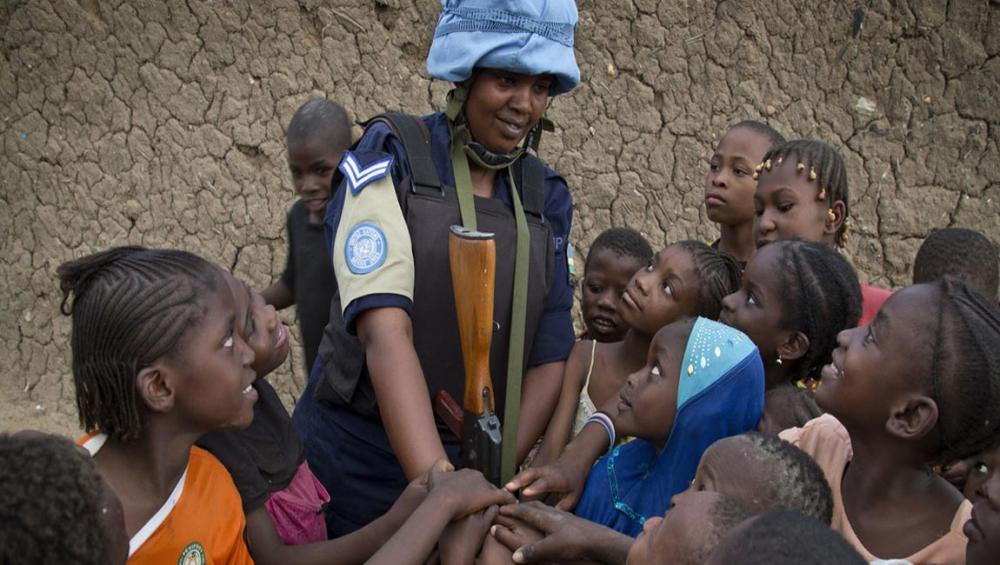Just Earth News | @JustEarthNews | 21 Nov 2018

Marco Dormino
New York, Citing the “encouraging progress” achieved by United Nations peacekeeping operations in Africa – which hosts half of all ongoing missions – UN chief António Guterres on Tuesday called the international community to strengthen cooperation and commitment to peacekeeping, during an open debate held at the Security Council.
Currently, half of all peacekeeping missions – seven out of 14 – and four in five UN ‘blue helmets’ are based in Africa. In addition, African nations provide nearly half of peacekeepers deployed worldwide, including almost two thirds of all women peacekeepers, and the majority of UN police officers.
“Peacekeeping in Africa continues to present some of our greatest challenges,” said Guterres. “United Nations missions are carrying out complex operations with multidimensional mandates in extremely dangerous environments,” he explained, citing transnational crime, non-State armed groups and terrorist groups, who sometimes target peacekeepers directly.
The Secretary-General paid tribute to all peacekeepers that have fallen in the line of duty, and to the eight African blue helmets stationed in the Democratic Republic of the Congo (DRC) who were killed last week while trying to “prevent an attack on the town of Beni” and “create a safe environment for those working to end the Ebola outbreak there”.
Inviting the people in Security Council room to observe a moment of silence, he reiterated his condolences for the families of the fallen.
“Peacekeeping is a remarkable exercise in global solidarity. United Nations peacekeepers are ready to pay the ultimate price for peace, and we are all in their debt,” he said.
Citing Liberia and Côte d’Ivoire as two examples of missions that were able to close because they had been successful, the Secretary-General highlighted how instrumental the operations in DRC, Mali, South Sudan, the Central African Republic and Sudan’s Darfur region, were to the respective ongoing political stabilization processes and peacebuilding efforts.
He praised the “excellent cooperation” at the “highest levels” between the UN and the African Union (AU) for all those missions to carry out their mandates successfully, including through the two Joint UN-AU Frameworks, on Enhanced Partnership in Peace and Security, and on the Implementation of Agenda 2063 and the 2030 Agenda for Sustainable Development.
“Our partnership with the African Union and African Member States is vital to our collective efforts for peace, and we must continue working to strengthen it,” he stated. “We are working closely with the AU on joint planning for the mandating of their peace support operations, and on legal and human rights compliance frameworks”.
The UN chief noted that he was encouraged by African support for his Action for Peacekeeping (A4P) initiative, launched earlier this year, and signed by 42 African governments to date. “This aims to mobilize all partners and stakeholders to first, to refocus peacekeeping around more realistic mandates; second, to make our missions stronger and safer; and third, to mobilize greater collective support for political solutions, and for well-equipped and well-trained troops,” he explained.
Given the many challenges that lie ahead, Guterres told the participants of the open debate that the UN has taken many measures to improve the effectiveness of the operations, including: a closer integration of conflict prevention, peacekeeping and peacebuilding activities; increasing the numbers of women in peacekeeping at all levels; and tackling sexual exploitation and abuse with more support to victims and more accountability.
“But as I have told this Council before, we need to understand that UN peacekeeping has limits,” the UN chief said. “We face more and more situations where we need peace-enforcement and counter-terrorism operations that can only be carried out by our partners – namely, the African Union and various subregional configurations”.
He added that “it is essential that African-led peace operations acting under the Security Council’s authority are provided with strong mandates and predictable, sustainable and flexible finance, including through UN assessed contributions where appropriate”.
Guterres expressed gratitude for the European Union and other donors who pledged to support the regional G5 Sahel Joint Force to combat terrorism and organized crime, but regretted that “so far, almost half the pledges have not been earmarked, let alone disbursed”.
“There has been progress over the past year,” he explained, noting that the Joint Force has “reached initial operational capacity” but that we are far from what is needed to fill “equipment shortfalls and capability gaps,” and meet the security needs of the Sahel.
“In our interconnected age, security challenges on one continent present a risk to the whole world,” the Secretary-General stated. “The factors that drive conflict in Africa – including poverty, youth unemployment, climate change, competition for resources, and transnational crime – threaten global security,” he added.
“Improving the impact and effectiveness of peacekeeping in Africa is a collective responsibility.”